Finding the right SiteGPT alternative can feel like a daunting task, especially when you want to provide exceptional customer experiences while keeping things simple and efficient. Whether you’re running a SaaS company, an e-commerce business, or managing customer service for an SME, the right AI-powered chatbot can transform your customer interactions.
This post dives into the top 8 alternatives to SiteGPT, comparing their extensive features, ease of use, and how they can boost customer satisfaction. You’ll discover solutions that offer personalized interactions, support for multiple platforms, and tools to engage your website visitors like never before.
Let’s explore the best tools to meet your unique needs while enhancing customer engagement and lead generation.
What is SiteGPT, and Why Consider Alternatives?
SiteGPT is an AI-powered chatbot designed to engage website visitors by leveraging your site’s content to provide instant support and improve customer interactions. With its simple and intuitive interface, SiteGPT helps businesses offer personalized responses to customer questions in real time, making it a popular choice among companies seeking to enhance their customer experience.
Despite its benefits, businesses may seek alternatives to SiteGPT for various reasons:
- Limited Advanced Features: Some users may want access to more features such as multi-channel support or deeper integration with messaging apps like Facebook Messenger.
- Customization Needs: If you’re looking to customize chatbots to a higher degree, SiteGPT’s tools might not fully align with your requirements.
- Budget Considerations: Alternatives may offer better pricing or more value-packed plans for businesses aiming to save while maintaining quality service.
- Scalability and Broader Use Cases: Businesses with unique requirements might need a tool that supports a broader range of functions, from lead generation to managing a robust knowledge base.
- Ease of Use for Developers and Non-Developers Alike: Some businesses need chatbots that require no coding knowledge, while others want flexibility to dive into development.
Exploring SiteGPT alternatives can help you find a solution tailored to your specific needs, whether that’s a user-friendly interface, advanced features, or tools to boost customer engagement across multiple platforms.
Criteria for Selecting a Chatbot Solution
When choosing a SiteGPT alternative, it’s essential to evaluate options based on your business needs and goals. Here are the key factors to consider when selecting the right AI-powered chatbot:
- Key Features and Functionality
Look for chatbots with advanced features that enable seamless customer conversations. Some essential capabilities include:- Instant answers for common customer questions.
- Support for multi-channel platforms like Facebook Messenger and YouTube videos.
- Customizable chatbots that adapt to your brand’s voice and tone.
- Ease of Use
A simple and intuitive interface is crucial, especially for teams with limited technical expertise. A user-friendly interface ensures quick setup and smooth management without requiring coding knowledge. - Integration with Existing Tools
Ensure the chatbot integrates with your existing CRM, knowledge base, and messaging apps, allowing seamless customer support across multiple platforms. This improves operational efficiency and keeps your team aligned. - Personalization and Customer Engagement
Choose a chatbot that enables personalized interactions based on user behavior. Personalization leads to improved engagement and boosts customer satisfaction. - Lead Generation and Sales Support
If your goal is to qualify leads and boost sales, select a solution with tools to capture and nurture leads during customer interactions. Features like prompt libraries and real-time responses can help drive customer engagement. - Scalability and Performance
Whether you’re an SMB or a larger organization, scalability matters. The chatbot should handle growing traffic, support diverse queries, and provide accurate responses as your business expands. - Cost and Value
Evaluate pricing plans to ensure the platform offers value for its features. Check for options that provide more features at competitive rates or offer free trials for testing. - Security and Data Privacy
Businesses often deal with sensitive data. The platform should have robust security measures to protect your database and ensure compliance with regulations.
By aligning these criteria with your business needs, you can confidently select a chatbot that enhances customer service while saving time and resources.
Top 8 SiteGPT Alternatives
Here’s a detailed look at eight alternatives to SiteGPT, each offering unique AI-powered chatbot solutions with advanced features to improve customer interactions and drive better customer engagement.
1. Desku
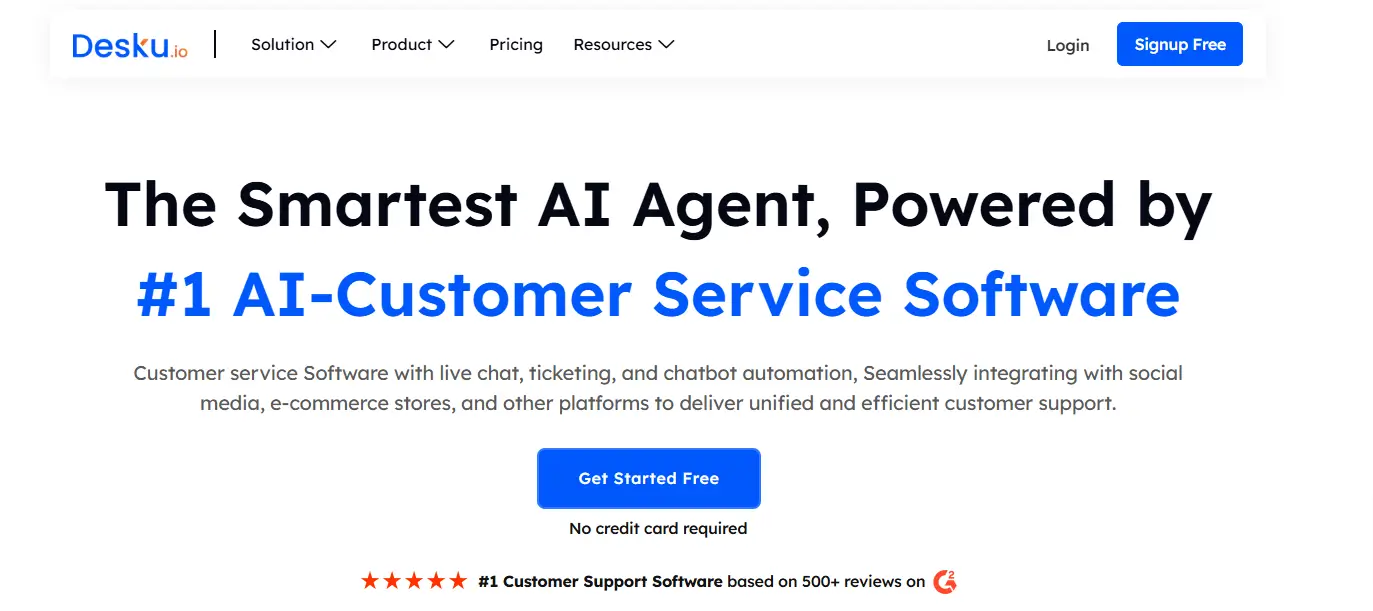
Desku is an all-in-one platform offering AI-powered chatbots and helpdesk tools. It simplifies customer interactions by providing a centralized dashboard for support and multi-channel communication. Perfect for SMEs and e-commerce businesses.
- Key Features:
Customizable chatbots for unique brand experiences and Seamless integration with CRMs and other tools. Centralized dashboard for managing support tickets and customer conversations. - Pros:
- Combines chatbot functionality with helpdesk tools.
- Supports multiple languages for broader reach.
- Cons:
- May not offer as many integrations as some competitors.
- Advanced customization can require additional setup time.
- Best For: SMEs, e-commerce businesses, and customer support teams looking for an all-in-one solution
- Pricing: Starts at $29/month for small businesses, with scalable plans for larger teams. Free trial available for new users.
2. Tidio
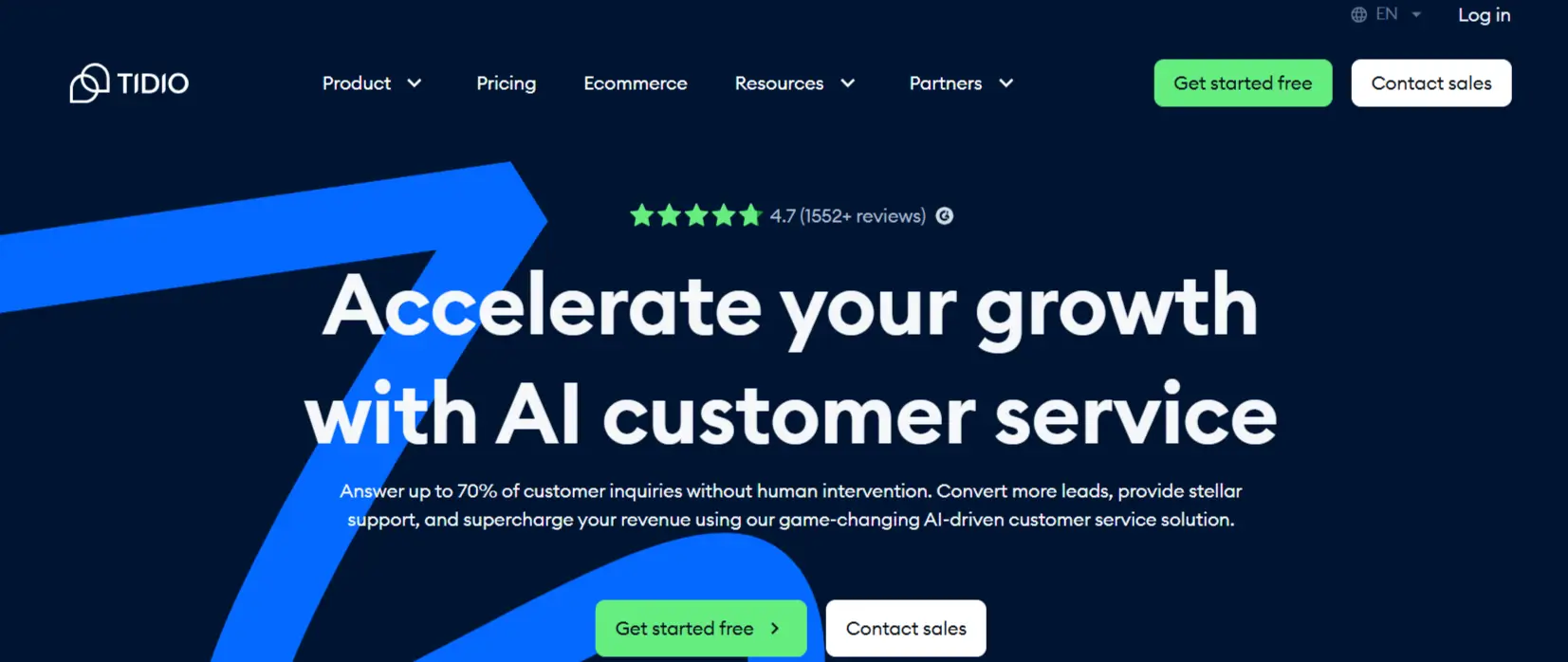
Tidio combines live chat and AI automation to engage website visitors in real time. Its user-friendly interface and free plan make it an excellent choice for SMBs looking to improve customer satisfaction and generate leads.
- Key Features:
Combines live chat with AI capabilities for instant support and lead generation. It supports multiple platforms, including Facebook Messenger. - Pros:
- User-friendly interface.
- Great for small and medium businesses.
- Cons:
- Limited free plan features.
- Best For: E-commerce businesses and customer support teams.
- Pricing: Free plan available; premium plans start at $18/month.
3. Intercom
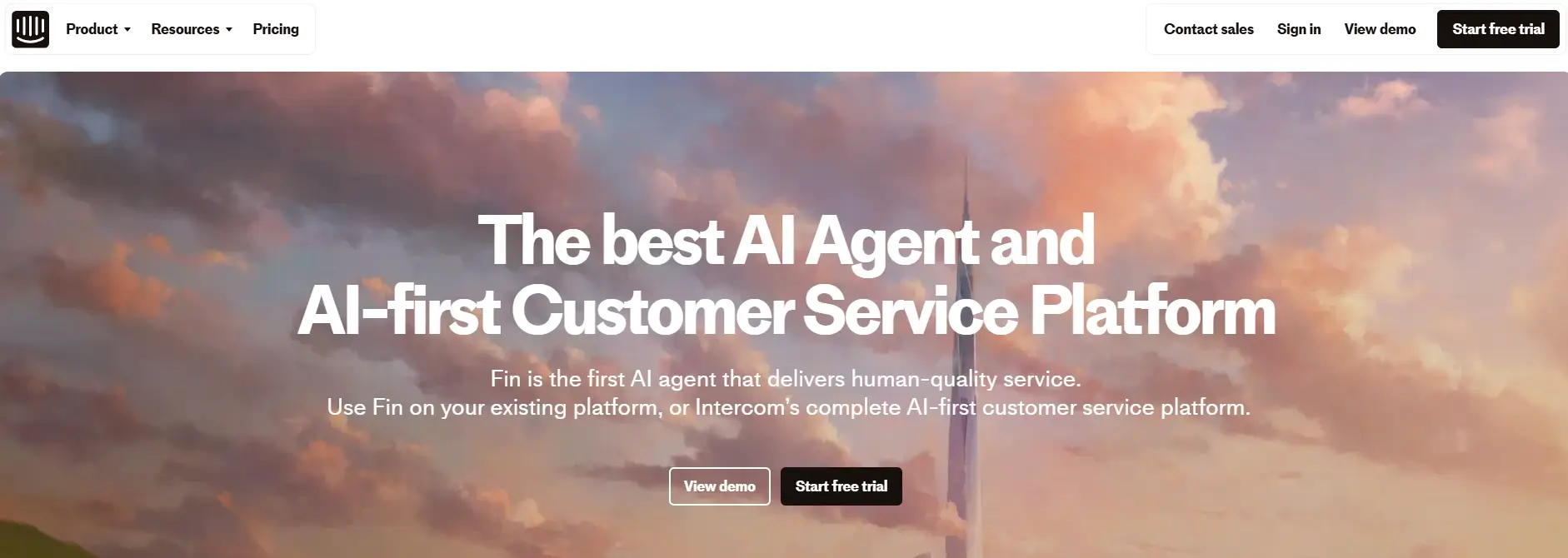
Intercom is a feature-rich solution for multi-channel support, customer engagement, and lead qualification. It’s tailored for SaaS companies and enterprises needing scalable tools for exceptional customer service.
- Key Features:
Offers AI-powered chatbots designed for multi-channel support and improved engagement. Its customizable chatbots can answer customer questions or qualify leads. - Pros:
- Rich integrations with popular tools like CRMs.
- Exceptional focus on customer relationship management.
- Cons:
- Pricing can be steep for smaller teams.
- Best For: SaaS companies and enterprises with a focus on customer engagement.
- Pricing: Starts at $74/month.
4. Zendesk Chat
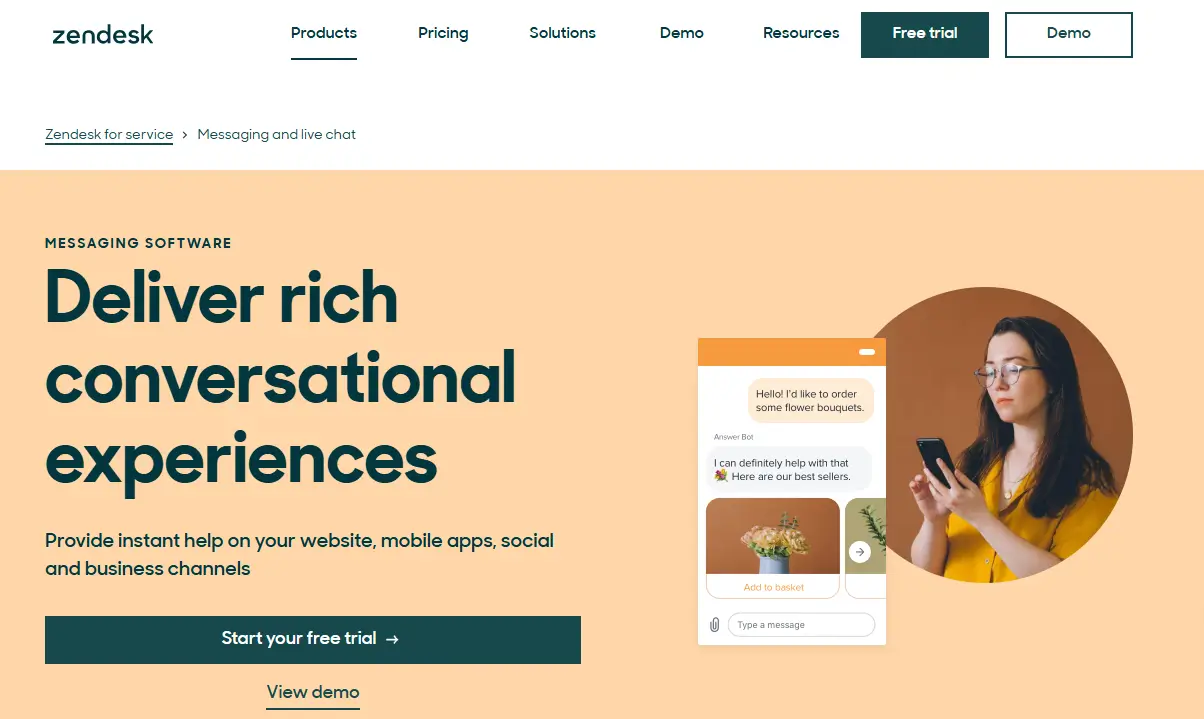
Zendesk Chat integrates seamlessly with the Zendesk suite, offering AI-powered tools for ticket management and instant support. It’s ideal for customer service teams already using Zendesk products.
- Key Features:
Known for its seamless integration with the Zendesk support suite, it provides instant answers and manages support queries using an AI assistant. - Pros:
- Great for ticketing and support questions.
- Supports multiple channels.
- Cons:
- Heavily tied to the Zendesk ecosystem.
- Best For: Customer support teams already using Zendesk.
- Pricing: Starts at $19/month.
5. Landbot.io
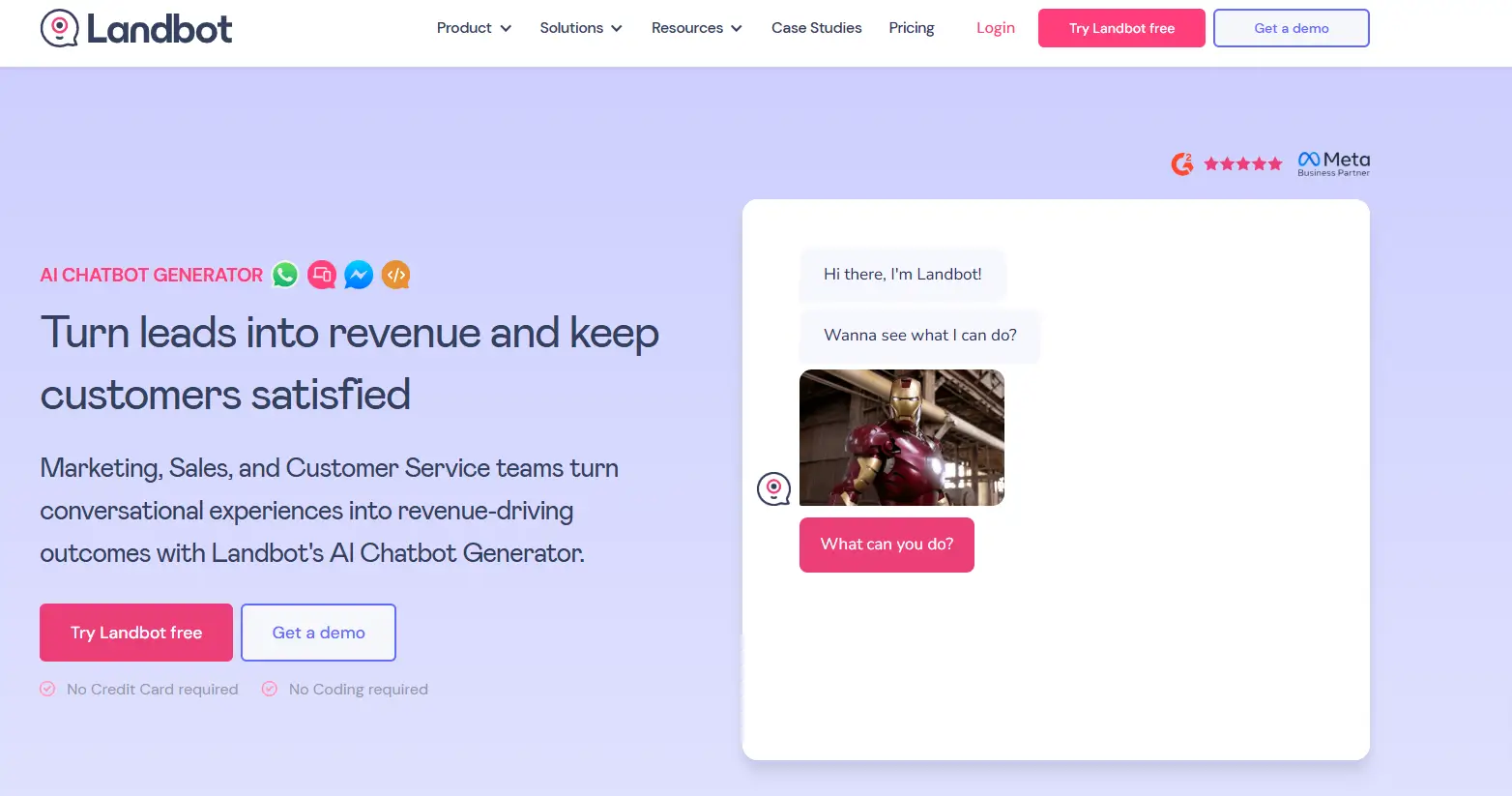
Landbot.io offers a drag-and-drop interface to build customizable chatbots without coding. Designed for startups and SMBs, it helps businesses capture leads and enhance customer engagement easily.
- Key Features:
Focuses on building custom chatbots using a drag-and-drop interface, perfect for businesses without coding knowledge. - Pros:
- Simple to use with a visually intuitive interface.
- Excellent for lead qualification and instant access to support.
- Cons:
- Limited scalability for larger businesses.
- Best For: SMBs and startups.
- Pricing: Free plan available; premium plans start at $30/month.
6. Botpress
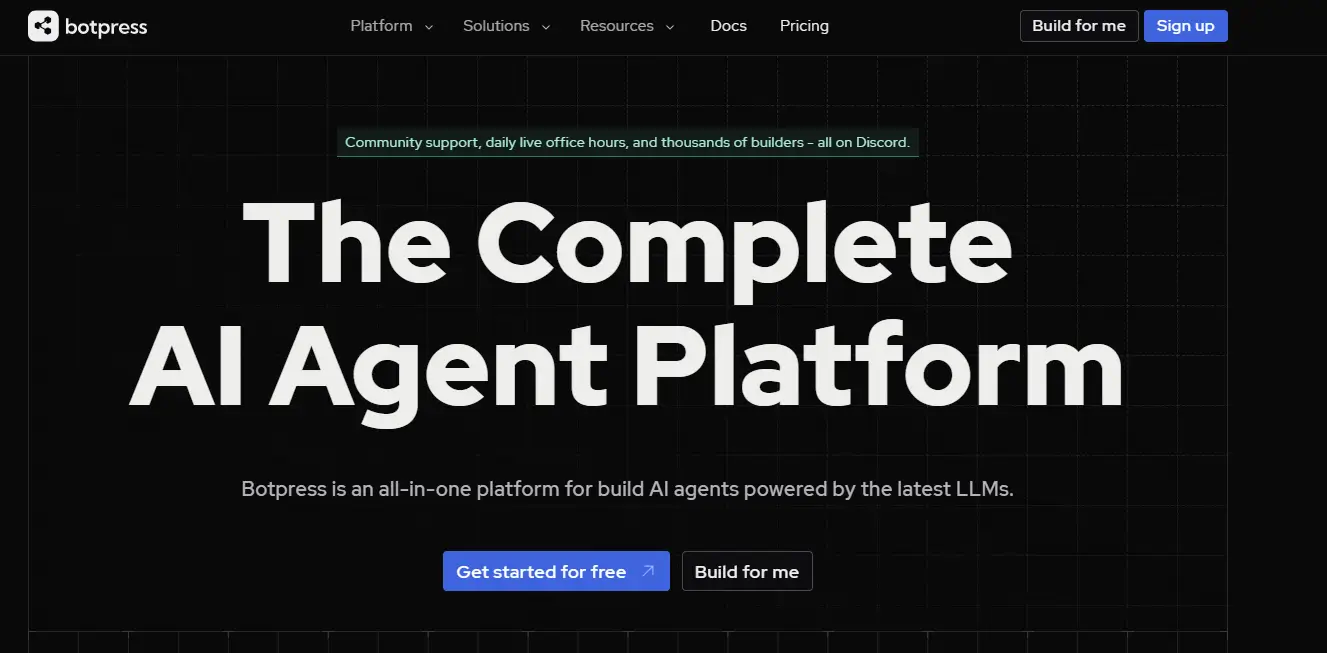
Botpress is an open-source chatbot platform focused on complete customization. Best for developers, it supports integrations with diverse sources and allows businesses to create unique, scalable solutions.
- Key Features:
An open-source chatbot framework that enables businesses to build chatbots customized to their needs. It integrates seamlessly with diverse sources and platforms. - Pros:
- Full customization options.
- Supports integrations with external databases and APIs.
- Cons:
- Requires technical expertise.
- Best For: Developers and companies looking for advanced features.
- Pricing: Free with premium add-ons.
7. ManyChat

ManyChat automates customer conversations on platforms like Facebook Messenger and Instagram. With pre-built templates, it’s a great tool for e-commerce businesses aiming to boost sales through social media.
- Key Features:
Specializes in chatbot automation for platforms like Facebook Messenger and Instagram, making it ideal for social media-heavy businesses. - Pros:
- Easy-to-use templates for quick setup.
- Focused on social commerce and boosting sales.
- Cons:
- Limited to social platforms.
- Best For: E-commerce businesses using social media for lead capture.
- Pricing: Free plan available; premium plans start at $15/month.
Comparison Table: Top 8 SiteGPT Alternatives
Below is a comparison of the top SiteGPT alternatives based on their key features, target users, pros, cons, and pricing:
| Platform | Key Features | Best For | Pros | Cons | Pricing |
|---|---|---|---|---|---|
| Desku | AI-powered chatbot, multi-channel support, centralized dashboard | SMEs, e-commerce, customer support teams | Combines chatbot and helpdesk, intuitive interface | Fewer integrations | Starts at $29/month |
| Tidio | Live chat, AI automation, multiple platform support | SMBs, e-commerce | Easy to use, free plan available | Limited advanced features | Free; $18+/month |
| Intercom | Advanced customer messaging, multi-channel, lead qualification | SaaS companies, enterprises | Scalable, strong integrations | Expensive for smaller businesses | Starts at $74/month |
| Zendesk Chat | AI suggestions, ticket management, multi-language support | Zendesk users, support teams | Great for Zendesk users, easy scalability | Limited features for non-users | Starts at $19/month |
| Landbot.io | Drag-and-drop chatbot builder, WhatsApp integration | Startups, SMBs | No coding needed, free plan available | Limited scalability | Free; $30+/month |
| Botpress | Open-source, advanced customization, CRM integration | Developers, technical teams | Highly customizable, cost-effective | Requires technical expertise | Free; paid add-ons |
| ManyChat | Social platform automation, lead nurturing templates | E-commerce, social media-heavy | Quick setup, excellent for social platforms | Limited web support | Free; $15+/month |
This table provides a quick snapshot to help you identify the best SiteGPT alternative for your business based on your specific needs.
Conclusion
Finding the right SiteGPT alternative depends on your business goals, customer engagement needs, and budget. Whether you’re looking for a tool with extensive features like Intercom, an affordable and intuitive option like Tidio, or a highly customizable platform like Botpress, there’s a solution for every type of business. These platforms offer instant support, personalized interactions, and tools to boost sales and enhance customer satisfaction.
By evaluating their key features, integration capabilities, and pricing, you can select the platform that best aligns with your needs. With the right AI-powered chatbot, your business can save time, improve customer conversations, and provide exceptional customer service across multiple platforms.
FAQs
1. What is the best alternative to SiteGPT for small businesses?
Desku and Landbot.io are excellent options for small businesses due to their user-friendly interfaces, affordability, and basic free plans.
2. Which platform is best for e-commerce businesses?
ManyChat and desku are great for e-commerce businesses, as they focus on lead generation, social media engagement, and boosting sales.
3. Do I need coding knowledge to use these alternatives?
Not necessarily. Platforms like Tidio and Landbot.io offer a simple and intuitive interface, requiring no coding knowledge to build or manage chatbots.
4. Which chatbot is ideal for customer service teams?
Zendesk Chat and Desku are tailored for customer service teams, offering robust tools for instant support and ticket management.
5. How can these platforms help boost customer engagement?
By offering instant answers, personalized responses, and support across multiple platforms, these tools enhance customer experience and keep customers engaged with your brand.
- About the Author
- Latest Posts
Gaurav Nagani was the Founder of Desku, an AI-powered customer service software platform.
- Email Management: Best Strategies, Tools & Tips for SaaS and Ecommerce
- Shared Inbox Guide: Definition, Benefits, Tools & Best Practices 2025
- LivePerson Pricing Exposed: What They Don’t Show You on Their Website
- Automate Customer Support with AI A Practical Guide
- Desku vs UsePylon: Which One Scales Better for Startups?


